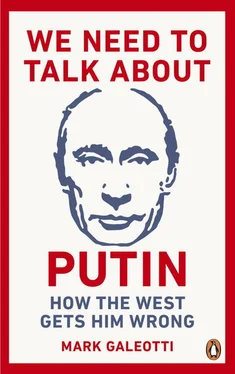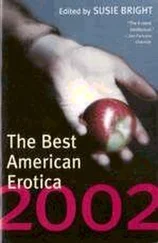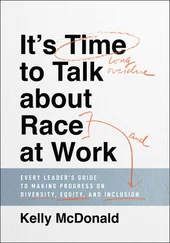There is, after all, always another grand thesis or eccentric philosophy on which to draw, and a whole gallery of pundits, scholars, authors and know-it-alls are trying to influence Putin – or at least to give the impression that they do. In many ways, we can consider them as philosophical entrepreneurs akin to the political and economic varieties – they pitch their ideas to the Kremlin, locked in a rhetorical arms race with each other for attention and relevance, often by being more strident and striking than the last. But just as there is no one figure who is the power behind Putin’s throne, nor is there any one philosophy or philosopher that shapes his thinking. So, I had to disappoint that eager analyst and tell him that there was no key to this particular lock – or rather, that the answer was at once simpler and more complex.
In the same way as there is no single detailed strategy behind his attempts to elevate Russia internationally, nor is there is an explicit, coherent ideology in his domestic policy. Instead, within his unemotional exterior there bubbles a mix of very human motivations that generate his policies and responses. In what does Putin believe? As explored in previous chapters, he is a gut-level patriot who believes that Russia should be considered a great power not because of its military strength, its economy or for any other specific index, but because it’s Russia . This kind of primordial nationalism is hardly unique to him, or to Russia, but it bites especially sharply given that he and his generation still remember being a superpower. To an extent, this is about security – the idea that Russia must protect itself in a scary and unpredictable world – but it is also about respect and honour. Outsiders ought to treat Russia right, treat it better than they have previously.
To Putin, security and respect are based on strength, and a strong country needs strong state power. Like his fears about Russia being weak and his resentment at it being disrespected, this feeling is to a large degree rooted in the formative post-Soviet chaos of the 1990s. One of his first priorities on assuming power – and, to be honest, one of his real achievements – was to stop Russia sliding further into near collapse and assert the ‘power vertical’, a system of top-down personal control. However, the details seem to matter less to him. He grew up and lived in a state socialist economy, and though he had practical complaints about day-to-day inefficiencies and shortages, as far as we know he didn’t object to it philosophically. Now he runs a capitalist state, albeit one warped out of shape by corruption and oligarchic monopolies, and again, while he may sometimes be unhappy about some of the details, he shows no signs of wanting fundamental systemic reform.
Putin will go for what works. He is happy to read writers like Ilyin and enjoy the sense that his innate bias towards a strong, powerful and centrifugal state has a rich cultural pedigree, to quote the soundbites that work today. But he believes in power and pragmatism rather than in philosophy. As long as he can get what he wants from the existing system, he’s content.
The same utilitarianism applies to Putin’s foreign policy. He is increasingly presented as a leader who is committed to overturning the existing world order and its liberal democratic norms. He will certainly criticise what is, after all, an order largely created by the West, in the West’s image, and for the West’s advantage. He also plays with the role as champion of traditional social values, of a bygone age where men were men, women knew their place, and no one had even heard of transgenderism. But again, this is more instrumental than ideological. He believes that the West is essentially hypocritical and that a mark of a great power – like the USA – is its exceptionalism, the idea that it can ignore the pesky rules when it wants to, which is what he wants for Russia. He is happy to exploit the current fractures within the West, presenting the EU as prey to degenerate ultra-liberalism; if you watch Russian television coverage about Europe – or ‘Gayropa’, as some spiteful propagandists put it – you’d believe that children there are being forcibly ripped from their families and given to gay couples, and that every spare bedroom has to house a jihadist Muslim migrant, by law. Ultimately, this is because these are ways in which Putin can persuade Russians that they don’t want to be more like us, while also dividing, distracting and demoralising us. Above all, though, he is trying to assert Russia’s great power status de facto and to get us to accept that vision. But it’s all politics. If the price of securing Russia a great power get-out-of-jail-free card were to be to bless non-traditional marriages in Europe and gender-neutral bathrooms in the American Midwest, I imagine he’d accept that deal in a heartbeat.
The disappointing truth for the alt-right fanboys in the West who see Putin as their ideal patriarch is that he is nothing of the sort. Yes, he is a tough, even ruthless leader, but in social terms he is hardly the champion of conservatism they think. He upholds gun control and abortion rights, and while he went along with small-minded laws against so-called ‘gay propaganda’ – which can be stretched to almost anything normalising gay relationships – it was not an initiative that came from the Kremlin. He is a confirmed Russian Orthodox Christian, but has demonstrated no hint of anti-Semitism, notable in a country with a dark history of its relations with its Jews. If anything, the opposite is true: he has encouraged the revival of synagogues at home and forged a close alliance with Israel abroad. Although he is happy to engage in horrifyingly sexist ‘banter’ – as such language is so often normalised – including joking about rape, he is again unusual by the standards of many Russians of his generation in listening to, and sometimes even empowering, women. For example, Elvira Nabiullina has been chair of the Central Bank since 2013. She has been carrying out a ruthless campaign to try and clean out toxic and criminal banks. In the process she often comes up against powerful vested interests, but Putin has backed her time and again against men who might have been useful new cronies for him.
This is one of the abiding themes of Putin’s politics: he is happy to play many roles to many audiences, as seems useful, but beyond those primal bedrock issues of power, security and respect, they are simply performances. The same pragmatism applies at home. According to some more hostile foreign commentators, Russia is near enough an earthly Mordor, North Korea with balalaikas. However, walk the streets of Moscow, and you’d find yourself in a modern, dynamic and frankly fun European city. Even out in the provinces, where money is tighter and the new middle class are rather thinner on the ground, there is ample evidence of change. By this I don’t just mean coffee houses, Wi-Fi and branches of Marks & Spencer (thirty-six in Russia so far), but also real debate, investigative journalism and even civil society.
Putin has no ideological commitment to anything, really, and so has no reason to try to impose totalitarianism. Ideologists are, after all, the scariest kinds of rulers, because they want to dictate what goes on inside their people’s heads. Putin is, of course, willing to use propaganda and media control to mobilise support and squeeze out alternative perspectives, but he doesn’t really care what people think – so long as they do what they are told. As I’ll consider in Chapter 9, this creates interesting spaces for unexpected freedoms and even a ‘resistance that dare not speak its name’ inside his Russia. Putin is not a philosopher – and that is something for which we, and Russians, should be thankful.
Читать дальше












